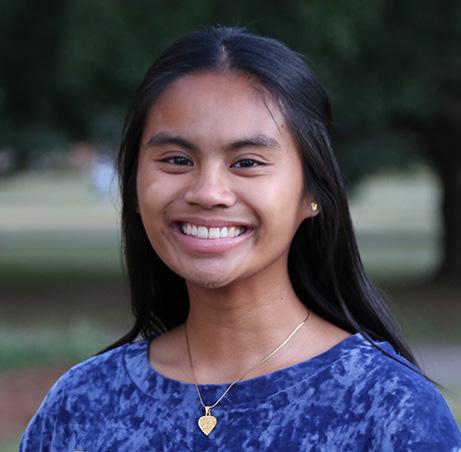
15 minute read
The enduring legacy of Rosalynn Carter
by Jackson Carlstrom, Editor-In-Chief
Remembering
Georgia Southwestern alumna, former First Lady, and humanitarian Rosalynn Carter passed away at the age of 96 in her beloved hometown of Plains, Georgia on November 19, 2023. This news comes two days after the announcement that she had joined her husband, former president Jimmy Carter, in hospice care. Born on August 18, 1927, in Plains, Rosalynn Smith Carter’s journey from a rural Georgia town to the global stage as an advocate and First Lady has been a source of inspiration for many.
The GSW community was given one last chance to honor her on Monday, November 27, during a wreath-laying ceremony. The ceremony took place in the morning in front of Carter 1 of the Rosalynn Carter Health and Human Sciences Complex, where a bronze statue of the former First Lady is located. The event was a part of a wider series of memorial events to remember the former First Lady and esteemed alumna of the university.
The Carter family motorcade arrived at Phoebe Sumter Medical Center on Monday morning, where Mrs. Carter’s remains were transferred over to a hearse. Former and current members of her U.S. Secret Service were present, paying their respects to the former First Lady. Departing from the medical center, the motorcade, with all four of Rosalynn’s children, proceeded to GSW, where the wreath ceremony took place. Hundreds of students and members of the community were present outside of Carter 1 to show their respect for Mrs. Carter and her family.

During the wreath-laying service, GSW President Neal Weaver and CEO of the Rosalynn Carter Institute for Caregivers Jennifer Olsen greeted the Carter family. They then placed two wreaths by Mrs. Carter’s bronze statue, commemorating her significant contributions to the fields of health and human sciences, as well as her enduring impact on the campus, the community and the nation. Students and community members were able to sign a condolence book inside Carter 1 following the wreath ceremony, offering a personal way for individuals to share their respects and memories of Mrs. Carter.
The wreath-laying service at Georgia Southwestern State University was a fitting tribute to Rosalynn Carter, reflecting the deep respect and admiration she garnered throughout her life as a devoted public servant, advocate, and alumna of the university.
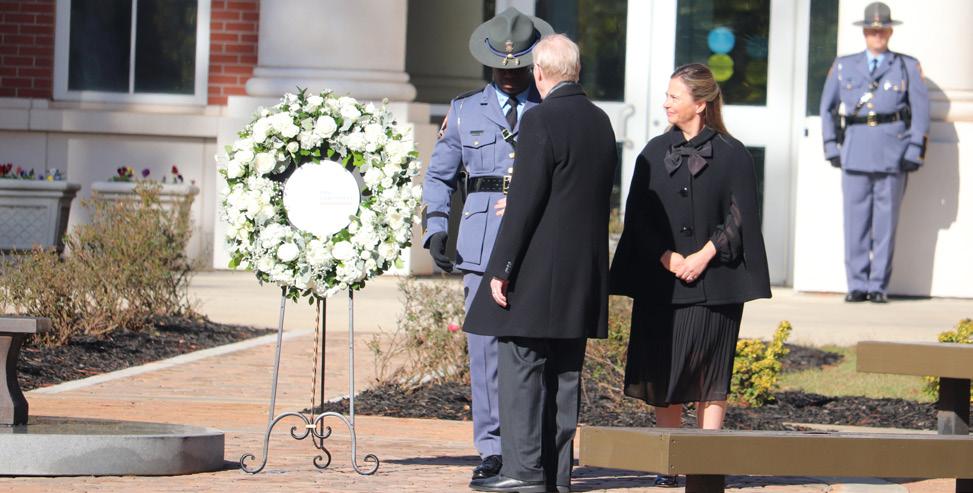
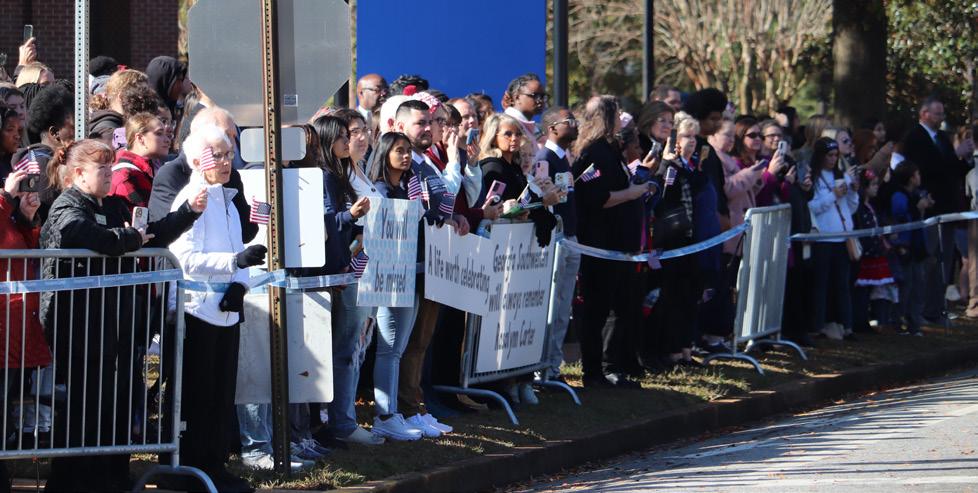

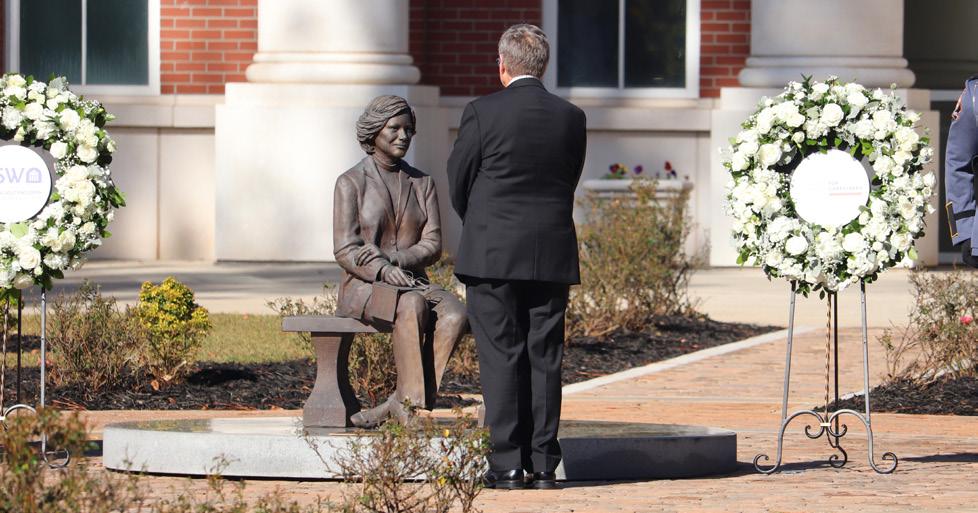


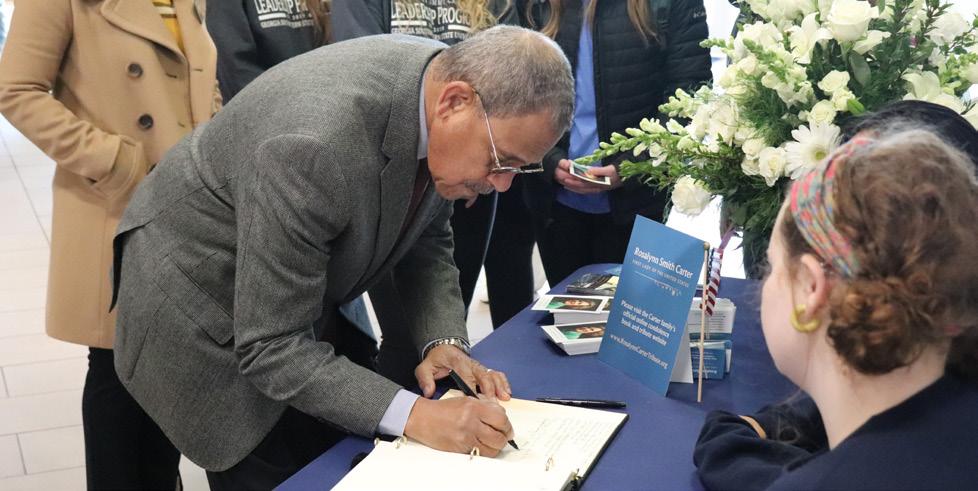
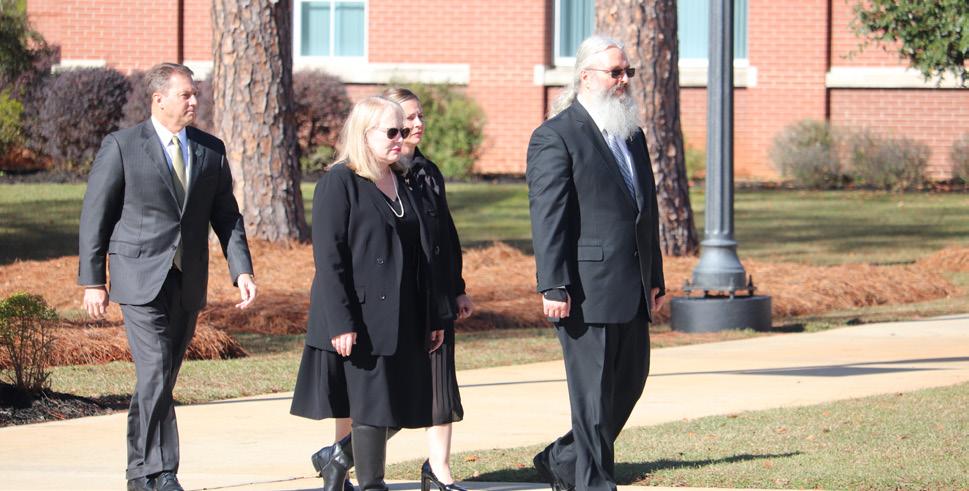
Rosalynn’s Story
Rosalynn Carter was born as Eleanor Rosalynn Smith on August 18, 1927, in Plains, Georgia. She was the daughter of Wilburn Edgar Smith and Allie Murray Smith, and was the first born of four children. The family experienced financial hardships all throughout Rosalynn’s childhood, and her parents worked multiple jobs to support the family. Her father worked as an auto mechanic and a farmer, while her mother worked as a teacher, a dressmaker, and a postal worker.
The small town of Plains that Rosalynn grew up in was a very close-knit community, with a population hovering around 400 throughout her childhood. Growing up as a child, she was shaped by strong religious and family values, as she grew up with church playing a central role in her life. For fun, she would hang out and play with boys her age who lived on her street, since there weren’t any girls her age who lived on the same street as her.


In 1940, Rosalynn’s father died from leukemia, when Rosalynn was just 13 years old. This significantly impacted Rosalynn, as she was suddenly thrust into a role where she had to help her mother tend the house and care for her siblings. During this period of her life, she was committed to supporting her family during difficult times. Rosalynn was an extremely diligent student in her academic life. She graduated as valedictorian from Plains High School in 1944. After graduating, she began studying at Georgia Southwestern College, fulfilling her father’s dream for her to pursue a higher education. At this time, Georgia Southwestern College was a two-year institution, and Rosalynn chose to attend it after high school due to its close proximity from Plains. She was a “day student,” meaning she traveled back and forth from Plains to Americus every day for her classes. Despite commuting, Rosalynn was extremely active on campus. She served as the Vice President of her class, a Campus Marshal, and she was a founding member of the Young Democrats Club. She also participated in the Tumbling Club.
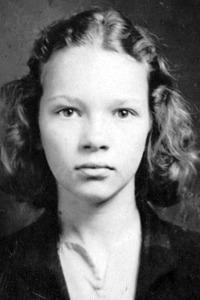
Her social circle included Ruth Carter, Jimmy Carter’s younger sister, with whom she became close friends after the Carters moved to a farm outside of town. It was Ruth who played matchmaker, fostering the connection between Rosalynn and her brother. Rosalynn first fell in love with Jimmy’s picture of him in his Annapolis uniform, not knowing then how significant that photograph would become.
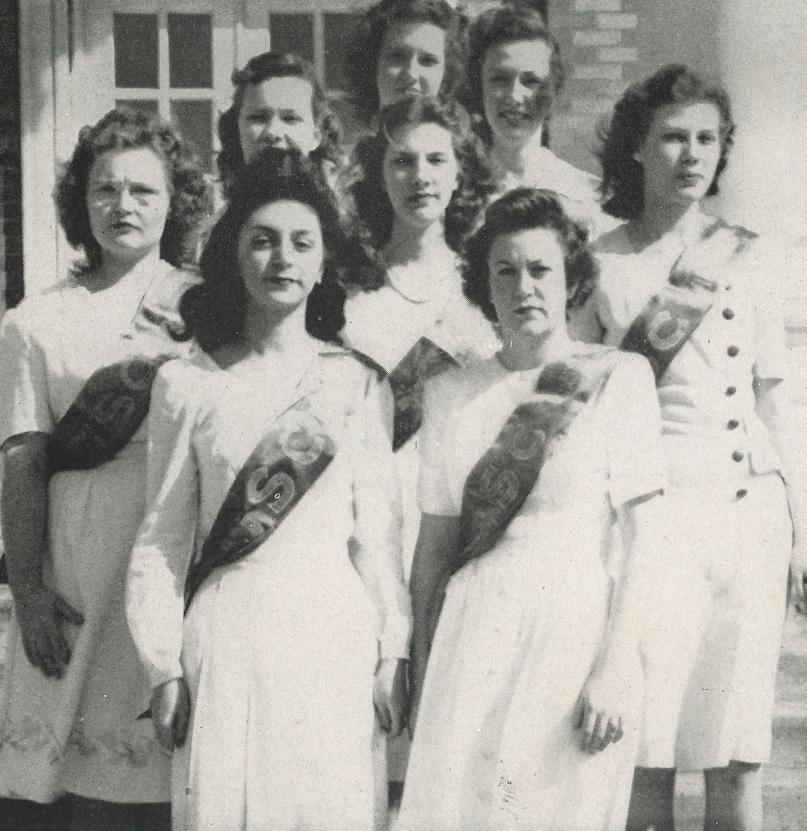

During the summer of 1945, after her first year at college, Rosalynn’s first encounter with Jimmy, back from the Naval Academy, led to their first date and kiss. This meeting sparked a romance that culminated in their marriage on July 7, 1946, at Plains Methodist Church, shortly after Rosalynn graduated with a Junior College degree in the spring of 1946.
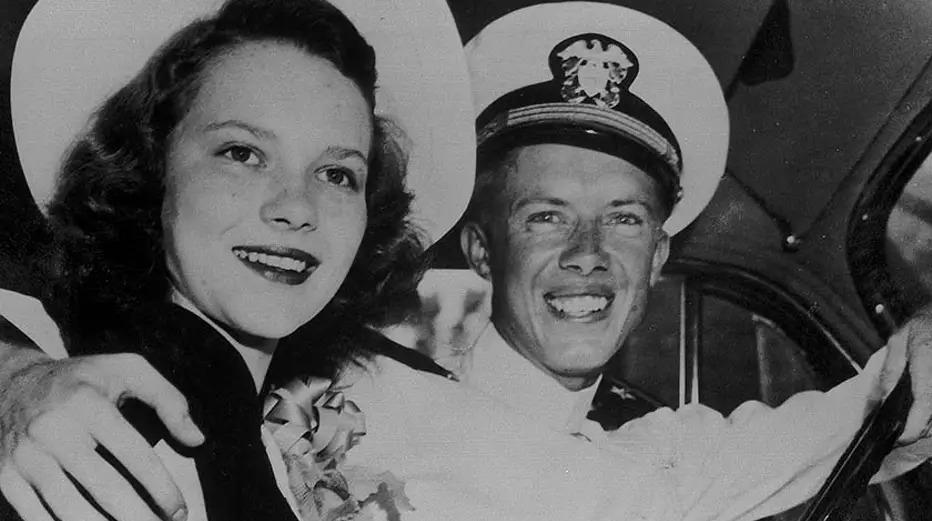
The young couple began life together living in Norfolk, Virginia, where Jimmy was stationed. The Navy kept the couple on the move, never living in the same places for too long. While Jimmy was in the navy, the family grew, with the birth of their three sons: Jack, James, and Donnel (Amy, the couple’s 4th child and only daughter, wouldn’t be born until after Jimmy left the Navy).
The family found themselves returning to Plains in 1953, following the death of Jimmy’s father. After his death, Jimmy left the Navy service, and he took on the responsibility of running the family peanut business, while Rosalynn worked full-time with bookkeeping and accounting for the business. Her responsibilities only began to increase when Jimmy entered the world of politics. Jimmy’s political career began in 1962, when he decided to run for a seat in the Georgia Senate. Rosalynn was initially resistant towards this at first, but she very soon became deeply involved in her husband’s campaign. She took charge of the campaign’s financial management, and she participated in door-to-door campaigning. Jimmy went on to win the election, and Rosalynn went on to be a major part of Jimmy’s campaigns ever since.
In 1970, Jimmy ran for governor of Georgia, and once again, Rosalynn campaigned for her husband. This time, she gained the confidence to campaign on her own and give speeches, an idea that terrified her originally. While campaigning for her husband during his run for governor, she got to talk to and interact with several Georgians all across the state. Prompted by the many conversations she had during this time, she took a strong interest in mental health issues.



Jimmy went on to win the governorship, and Rosalynn became the First Lady of Georgia. Rosalynn participated in all of the traditional responsibilities of First Ladies, like hosting events. But she also handled the financial accounting of the Governor’s Mansion and its landscaping. During this time, Rosalynn continued to focus her attention in the field of mental health. She was appointed to the Governor’s Commission to Improve Services for the Mentally and Emotionally Handicapped, a commission that she had encouraged her husband to establish, and during her time on that commission, many of the commission’s recommendations were approved and written into law. Rosalynn also went on a statewide tour through different mental health facilities across Georgia in August 1971. Rosalynn also served as an honorary chairperson of the Georgia Special Olympics and as a volunteer at an Atlanta hospital.
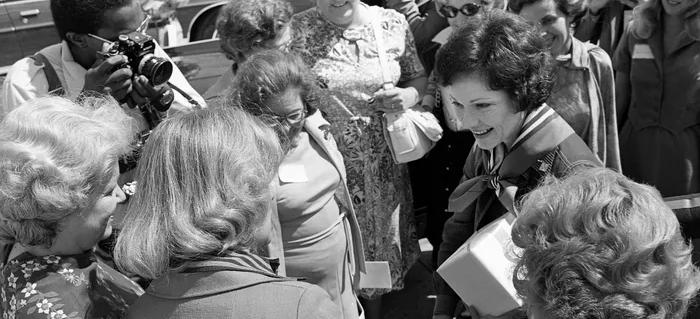
Jimmy’s gubernatorial term ended in January 1975, and the family returned to Plains. By this time, Jimmy had already announced his run for president of the United States, and once again, Rosalynn played a significant and influential role in his presidential campaign. At this time, Jimmy Carter was a relatively unknown figure outside the state of Georgia, so Rosalynn sought to build up some awareness for her husband and his campaign. Rosalynn campaigned for her husband in 41 different states, visiting places that Jimmy was unable to reach. Her style of campaigning was personal and relatable; she engaged in one-on-one conversations with voters, listening to their concerns and discussing her husband’s policies. She was also able to utilize the media effectively, giving interviews and appearing in televised events, bringing Jimmy Carter’s campaign to a wider audience.

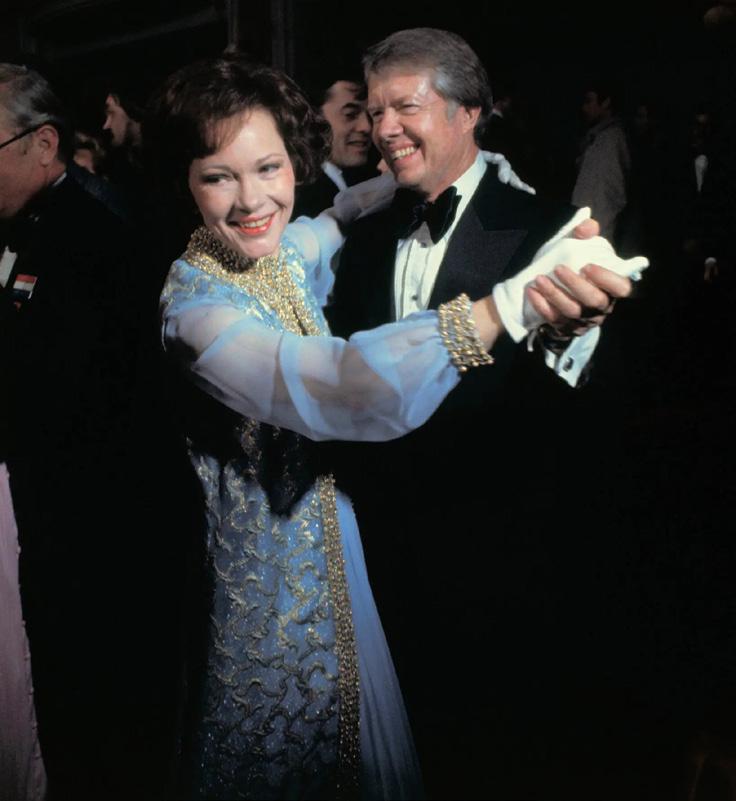
Enough name recognition and good will was built up for Jimmy to win the democratic nomination for president, and ultimately the presidency. Rosalynn Carter, serving as First Lady from 1977 to 1981, significantly expanded the role’s scope through her dedication to mental health advocacy, political involvement, and diplomatic efforts. Notably, she was an active honorary chair of the President’s Commission on Mental Health, advocating for legislation that resulted in the Mental Health Systems Bill. Pioneering in her approach, she regularly attended Cabinet meetings, a first for a First Lady, to stay informed on governmental affairs. Her international diplomacy included a substantial trip to Latin America in 1977, focusing on defense and trade issues. Rosalynn’s practicality was evident in her modest approach to White House hosting and decor, prioritizing economic considerations over extravagance. Rosalynn remained a committed advocate for her causes and an integral partner in her husband’s presidency, showcasing a blend of traditional duties with groundbreaking policy and advocacy efforts.
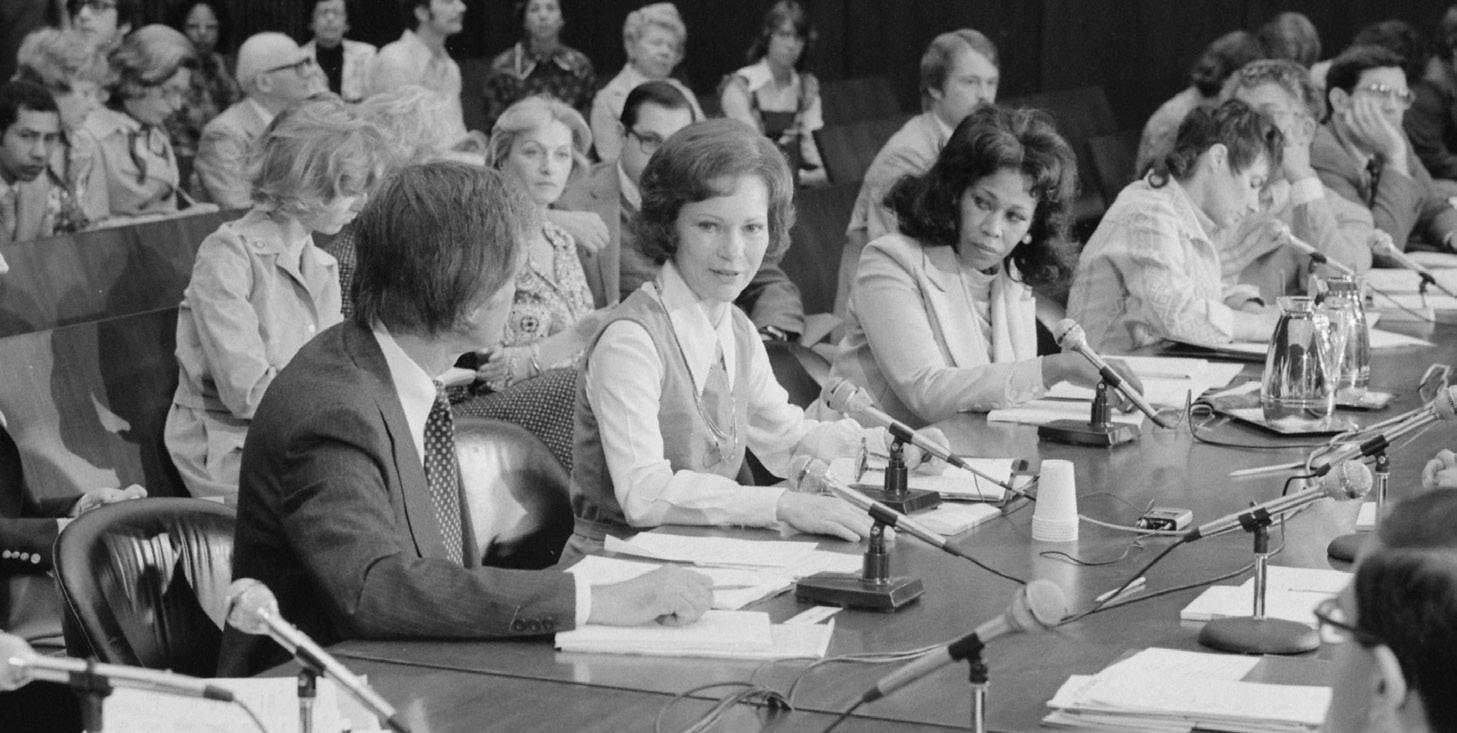
After Jimmy’s defeat in the 1980 presidential election, the family returned to Plains. Despite returning to small town life, Rosalynn’s life was anything but quiet. She and Jimmy co-founded The Carter Center, a nonprofit focused on peacekeeping, safeguarding democracy, and enhancing global health, in 1982. To this day, The Carter Center has made tremendous impacts in over 65 countries. The Carter Center has led campaigns to eradicate diseases, monitored elections in new democracies, promoted human rights, and helped resolve conflicts. Through The Carter Center, Rosalynn played an advisory role in high-profile peace negotiations in countries like Bosnia, Sudan, Ethiopia, and North Korea. She also oversaw The Carter Center’s mental health program, where she helped to combat the stigma against mental illness and promoted improved mental health care.
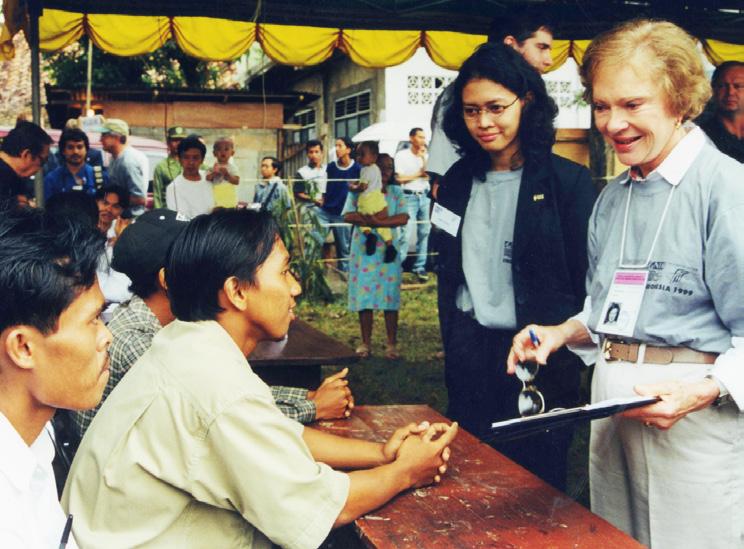

In 1987, Rosalynn founded The Rosalynn Carter Institute for Caregivers (RCI), headquartered at Georgia Southwestern State University. The RCI stemmed from her personal experiences with caregiving during her childhood, when she had to help care for her sick father and her siblings after he died. RCI’s mission is to “to promote the health, strength, and resilience of caregivers at every stage of their journey.” The RCI goes about their mission by operating with empathy, emphasizing equity and collaboration, and focusing on community support and knowledge. Today, the RCI leads efforts to support caregivers, acknowledging the mental health challenges they face, such as isolation and stress. The RCI has also participated in several different campaigns, most notably the “Every Child by Two” campaign for early childhood immunization and the “Last Acts: Care and Caring at the End of Life” campaign for compassionate end-of-life care.
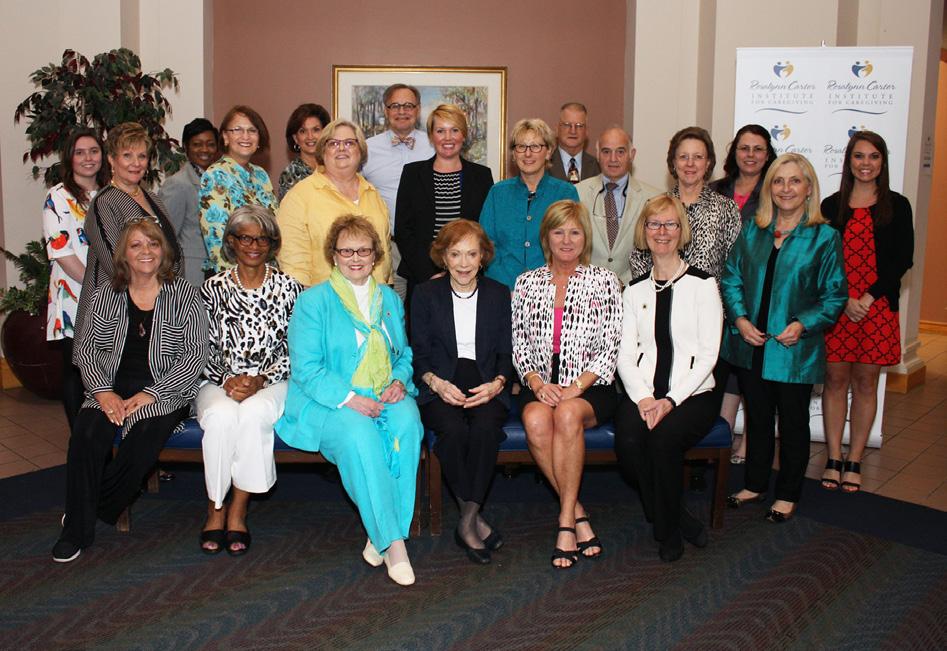
Outside of The Carter Center and the RCI, Rosalynn contributed to building houses for the poor with Habitat for Humanity alongside her husband. She has authored several books, including her autobiography entitled “First Lady from Plains” and other works that focused on caregiving and mental health. She also served as a church deacon at Maranatha Baptist Church in Plains and was a distinguished fellow at the Emory University Department of Women’s Studies. In recognition of all of her efforts, Rosalynn was inducted into the National Women’s Hall of Fame in 2001, becoming the third first lady to receive this honor.
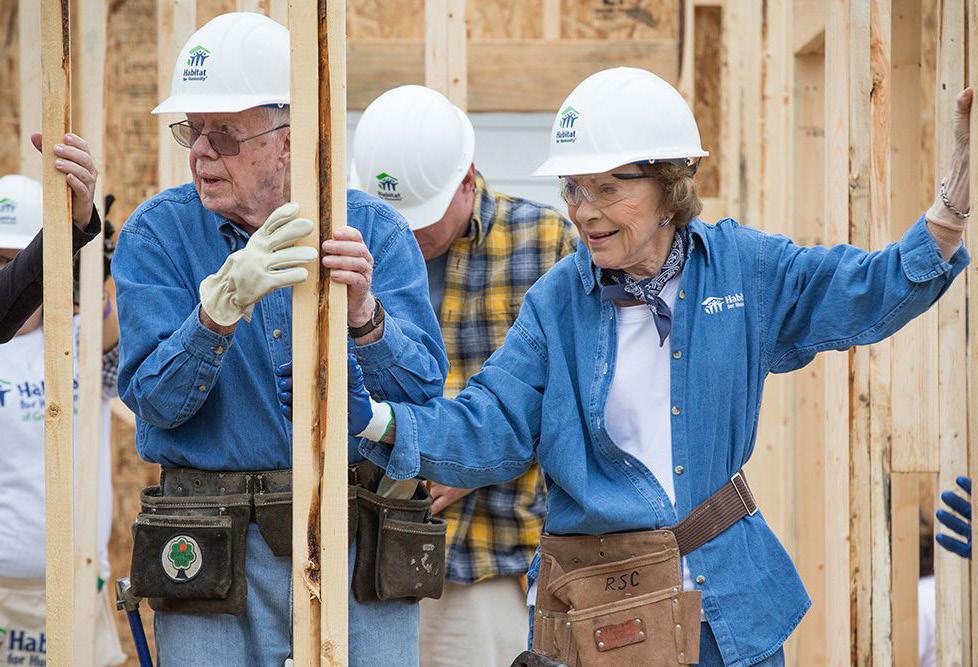
Rosalynn has also received several honors from Georgia Southwestern State University since graduating. In 1975, she was recognized as the first recipient of GSW’s Aeolian Award recognizing distinguished alumni in their respective fields. She was nominated by GSW in 1987 for the Distinguished Alumnus Award from the American Association of State Colleges and Universities, an award that she went on to win. She was awarded an honorary Doctor of Humane Letters degree in 2001 by GSW, and she earned the Regents Hall of Fame Alumni Award in 2011 from the University System of Georgia after her nomination by GSW.
During her final years, she enjoyed spending time with family, including 12 grandchildren and 14 great-grandchildren. She spent her final two days in hospice care at her home in Plains with her husband.
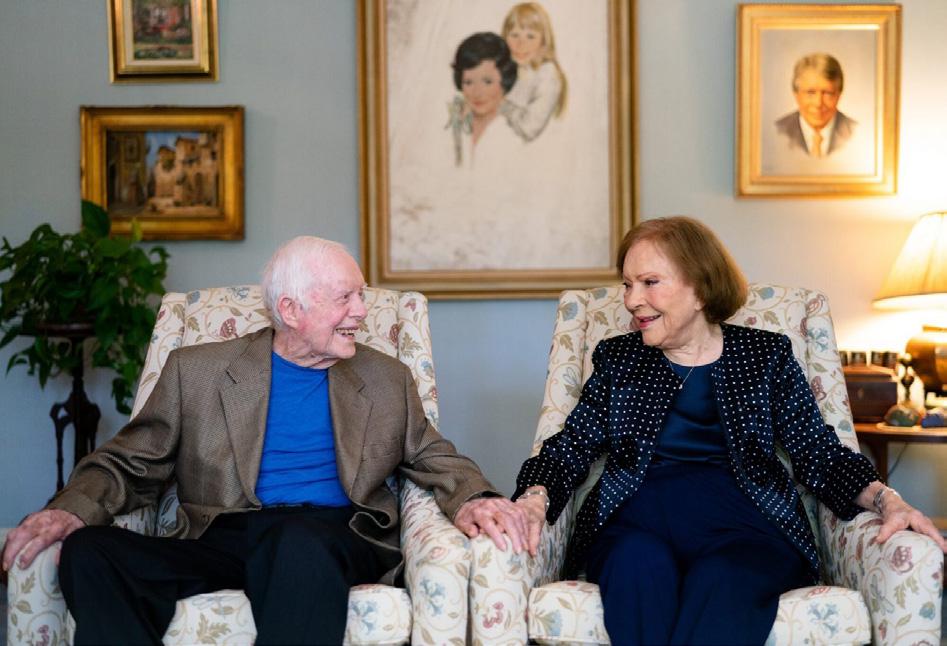
Interviews
Jennifer Olsen, CEO of Rosalynn Carter Institute for Caregivers
I worked and I continue to work at the Rosalynn Carter Institute for Caregivers here on campus. And Mrs. Carter was also my neighbor. I live in Plains, about eight houses down from the Carters. And so I’ve had the pleasure of spending a lot of time with her. She was my boss. But I always say that I was both working with her and for her, because our conversations would be such that she would gently give us guidance as to where the institute should go, but she was never overly direct. And so I think that was one of her best skills. When you read about her time in the White House with President Carter, she was able to nudge without being forceful. And I think that’s how she was as a leader and as a boss for the institute.
For those who never got to know her personally, I can tell you that she was warm and always made you feel like you mattered. Often caregivers feel invisible, like they’re just the wife or the daughter or the sister of someone. And Mrs. Carter was really great at showing gratitude and appreciation for the unique role that that person held. And so, sitting next to her, you felt like you were sitting next to a friend.
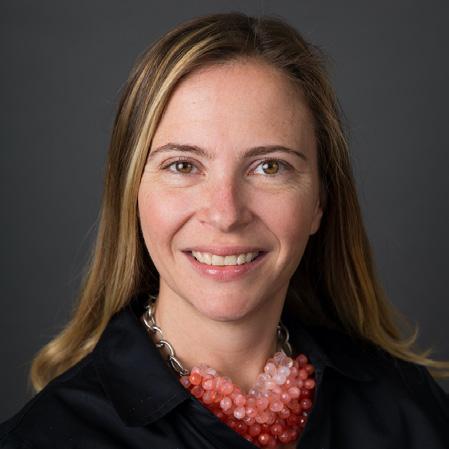
Ashley Carag, Member of President Jimmy Carter Leadership Program
I’m in the third cohort of the President Jimmy Carter Leadership Program, and I’m also a nursing major. I met Mrs. Rosalynn Carter twice, once in my freshman year and again in my sophomore year. The first time was in Plains at a food distribution. Initially, it was mandatory for us to go, but that changed after I met her. Meeting her instilled a sense of service in me. We were serving a hundred families, and it was cold on that Saturday morning. I just wanted to go home. But after meeting her, my perspective changed. You wouldn’t expect someone of her stature to be there, serving in just a simple T-shirt and jeans. There were so many people there, and I didn’t realize it, but they were Secret Service agents there because Rosalynn Carter was there! She was helping us serve these families.
Her involvement really inspired us in the program. It showed that no matter your age or situation, you can serve others. She embodied the leadership we’re trying to implement in our lives, to improve the world in small ways. Meeting her has inspired us to be better and more compassionate leaders.
